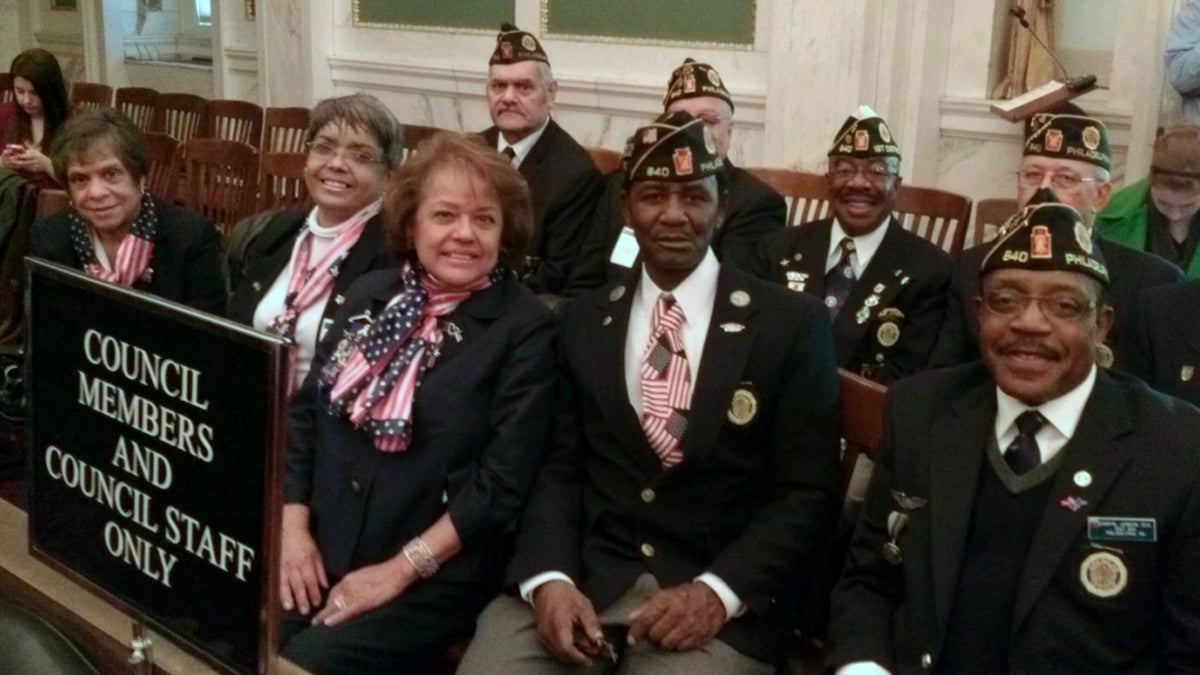Philly financial empowerment centers help poor and homeless find stability
Listen
Kenneth Atwood (first row, second from right). Mr. Atwood is shown seated in Philadelphia City Council chambers. (Image courtesy of Kenneth Atwood)
When Kenneth Atwood Sr. walked into a Philadelphia financial empowerment center in May, he was one of the 60,000-plus U.S. veterans without a home.
He was living on the streets, in cars, and beneath the Boardwalk in Atlantic City. He was subsisting on $300 a month in disability benefits, which he received as a result of being diagnosed with post-traumatic stress disorder.
He’d lost his house amid a divorce in the 2000s, and was laid off from his position as a cook at the Trump Plaza.
“I was one of the statistics,” he said.
At the center, Atwood received free, one-on-one advice on how to manage the little money he had. He learned of an error on his credit report, which is being removed. He saved enough money to buy a used car. He even started renting an apartment in his native South Philly after being approved for a larger disability payment.
He said his counselor, Mariele McGlazer, is like a financial angel on his shoulder who keeps him from buying unnecessary items.
“In the back of my head, she’s like, ‘Pop! Pop! You got to do this. You need to get yourself together,'” he said, “because I have a problem saving money.”
With a $3 million grant funded by Bloomberg Philanthropies, Philadelphia’s government opened seven centers this year that provide free financial advice to mostly low- and moderate-income residents. Though the concept of financial literacy is not new, New York City Mayor Michael Bloomberg launched the “financial empowerment center” model in 2008. Such programs have since opened in San Antonio, Denver and Nashville.
Philadelphia’s centers are scattered throughout the city, in areas including North Philly, Center City and Germantown. So far, their eight counselors have met with 1,853 people.
There is only one requirement for obtaining services: You must be 18 or older.
Despite the absence of an income eligibility requirement, many of the centers’ visitors are poor. Fifty-six percent of Philadelphia’s clients are saddled with more than $10,000 in debt, and their median income is $21,063. Sixteen percent are unemployed. Fourteen percent do not have bank accounts.
Counselors converse with banks in specific language
The city’s financial counselors have helped reduce their clients’ debt by $1.3 million, said program manager Carey Morgan. She said they have also helped people boost their credit scores, open bank accounts, and negotiate lower interest rates on loans.
“We will work on behalf of the client to reduce debt for them by calling their creditors, by calling the vendors, by working with the banks directly,” she said. “It’s almost like a language of its own that you have to learn to speak in order to make headway when you have a problem.”
Morgan wants the financial empowerment centers’ data and know-how to eventually inform city policy. For instance, she said, the Nutter administration could work with banks to simplify their fees, or advocate for check-cashing outlets to reduce their exorbitant charges.
“What we want to do is change the system overall,” she said. “Twenty-eight percent of Philadelphians [are] living in poverty. … They’re marginalized from the financial system. And we want to help to rectify that by looking at the larger systemic issues.”
John Caskey, an economics professor at Swarthmore College, said the centers are praiseworthy. But he doubts that they will reduce demand among low-income residents for financial services that many see as predatory, such as check-cashing operations.
“I’m a little skeptical that financial education alone will make much impact on the use of check-cashing outlets,” he said. However, he added, “Financial literacy education is unambiguously a good thing. Having a more informed consumer, there can be nothing wrong with that.”
The grant for the financial empowerment centers runs out in about two years. Morgan hopes that the city will support it afterward with the help of businesses and the philanthropic sector.
WHYY is your source for fact-based, in-depth journalism and information. As a nonprofit organization, we rely on financial support from readers like you. Please give today.

